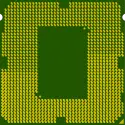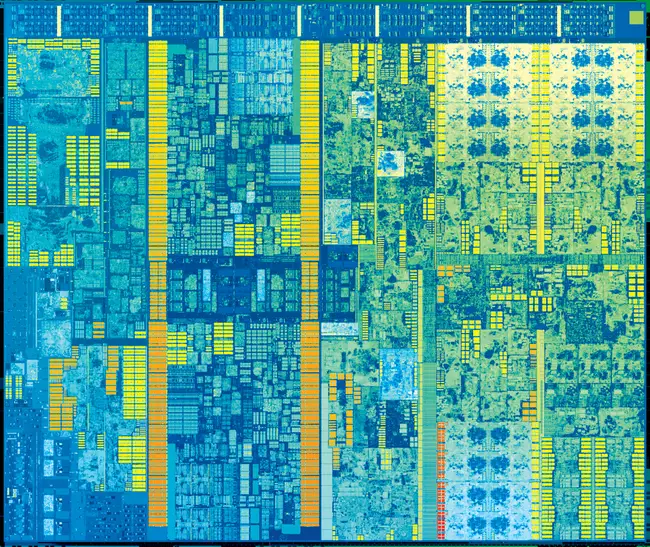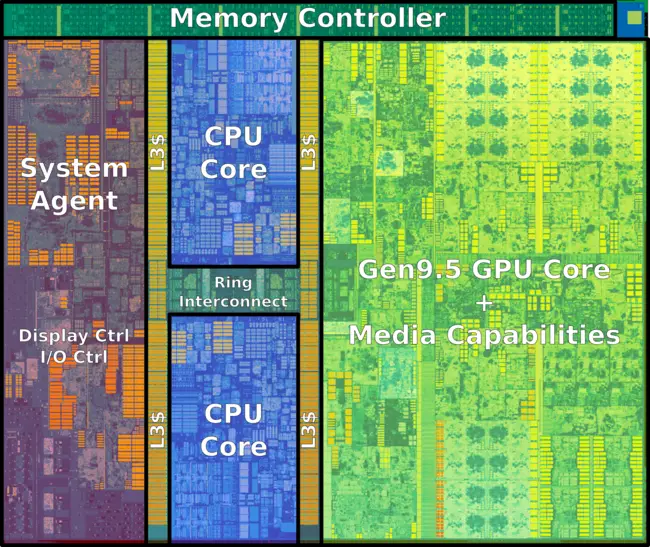From WikiChip
Difference between revisions of "intel/core i3/i3-7310t"
m (Bot: moving all {{mpu}} to {{chip}}) |
|||
| (3 intermediate revisions by 2 users not shown) | |||
| Line 1: | Line 1: | ||
{{intel title|Core i3-7310T}} | {{intel title|Core i3-7310T}} | ||
| − | {{ | + | {{chip |
|name=Core i3-7310T | |name=Core i3-7310T | ||
|no image=No | |no image=No | ||
| Line 42: | Line 42: | ||
|electrical=Yes | |electrical=Yes | ||
}} | }} | ||
| − | '''Core i3-7310T''' is a {{arch|64}} [[dual-core]] low-end performance [[x86]] desktop microprocessor | + | '''Core i3-7310T''' is a {{arch|64}} [[dual-core]] low-end performance [[x86]] desktop microprocessor introduced by [[Intel]] in early [[2017]]. This chip, which is based on the {{intel|Kaby Lake|l=arch}} microarchitecture, is fabricated on Intel's improved [[14 nm|14 nm+ process]]. This processor, which has a base frequency of 3.4 GHz with a TDP of 35 Watts, supports up to 64 GiB of dual-channel DDR4-2400. The i3-7310T incorporates Intel's {{intel|HD Graphics 630}} [[IGP]] operating at 350 MHz with burst frequency of 1.10 GHz. |
| − | |||
| − | |||
| − | |||
== Cache == | == Cache == | ||
| Line 159: | Line 156: | ||
|avx=Yes | |avx=Yes | ||
|avx2=Yes | |avx2=Yes | ||
| − | + | ||
|abm=Yes | |abm=Yes | ||
|tbm=No | |tbm=No | ||
Latest revision as of 15:18, 13 December 2017
| Edit Values | ||||||||||||
| Core i3-7310T | ||||||||||||
| General Info | ||||||||||||
| Designer | Intel | |||||||||||
| Manufacturer | Intel | |||||||||||
| Model Number | i3-7310T | |||||||||||
| Market | Desktop | |||||||||||
| Introduction | 2017 (launched) | |||||||||||
| Shop | Amazon | |||||||||||
| General Specs | ||||||||||||
| Family | Core i3 | |||||||||||
| Series | i3-7300 | |||||||||||
| Locked | Yes | |||||||||||
| Frequency | 3,400 MHz | |||||||||||
| Bus type | DMI 3.0 | |||||||||||
| Bus rate | 8 GT/s | |||||||||||
| Clock multiplier | 34 | |||||||||||
| Microarchitecture | ||||||||||||
| ISA | x86-64 (x86) | |||||||||||
| Microarchitecture | Kaby Lake | |||||||||||
| Platform | Kaby Lake | |||||||||||
| Chipset | Sunrise Point, Union Point | |||||||||||
| Core Name | Kaby Lake S | |||||||||||
| Core Family | 6 | |||||||||||
| Core Model | 158 | |||||||||||
| Core Stepping | B0 | |||||||||||
| Process | 14 nm | |||||||||||
| Technology | CMOS | |||||||||||
| Word Size | 64 bit | |||||||||||
| Cores | 2 | |||||||||||
| Threads | 4 | |||||||||||
| Max Memory | 64 GiB | |||||||||||
| Multiprocessing | ||||||||||||
| Max SMP | 1-Way (Uniprocessor) | |||||||||||
| Electrical | ||||||||||||
| Vcore | 0.55 V-1.52 V | |||||||||||
| TDP | 35 W | |||||||||||
| Tjunction | 0 °C – ? °C | |||||||||||
| Tstorage | -25 °C – 125 °C | |||||||||||
| Packaging | ||||||||||||
| ||||||||||||
Core i3-7310T is a 64-bit dual-core low-end performance x86 desktop microprocessor introduced by Intel in early 2017. This chip, which is based on the Kaby Lake microarchitecture, is fabricated on Intel's improved 14 nm+ process. This processor, which has a base frequency of 3.4 GHz with a TDP of 35 Watts, supports up to 64 GiB of dual-channel DDR4-2400. The i3-7310T incorporates Intel's HD Graphics 630 IGP operating at 350 MHz with burst frequency of 1.10 GHz.
Cache[edit]
- Main article: Kaby Lake § Cache
|
Cache Organization
Cache is a hardware component containing a relatively small and extremely fast memory designed to speed up the performance of a CPU by preparing ahead of time the data it needs to read from a relatively slower medium such as main memory. The organization and amount of cache can have a large impact on the performance, power consumption, die size, and consequently cost of the IC. Cache is specified by its size, number of sets, associativity, block size, sub-block size, and fetch and write-back policies. Note: All units are in kibibytes and mebibytes. |
|||||||||||||||||||||||||||||||||||||
|
|||||||||||||||||||||||||||||||||||||
Memory controller[edit]
|
Integrated Memory Controller
|
||||||||||||||
|
||||||||||||||
Expansions[edit]
|
Expansion Options
|
||||||||
|
||||||||
Graphics[edit]
|
Integrated Graphics Information
|
||||||||||||||||||||||||||||||||||||||||||||||||||||||||||||||||||||
|
||||||||||||||||||||||||||||||||||||||||||||||||||||||||||||||||||||
| [Edit] Kaby Lake (Gen9.5) Hardware Accelerated Video Capabilities | |||||||
|---|---|---|---|---|---|---|---|
| Codec | Encode | Decode | |||||
| Profiles | Levels | Max Resolution | Profiles | Levels | Max Resolution | ||
| MPEG-2 (H.262) | Main | High | 1080p (FHD) | Main | Main, High | 1080p (FHD) | |
| MPEG-4 AVC (H.264) | High, Main | 5.1 | 2160p (4K) | Main, High, MVC, Stereo | 5.1 | 2160p (4K) | |
| JPEG/MJPEG | Baseline | - | 16k x 16k | Baseline | Unified | 16k x 16k | |
| HEVC (H.265) | Main, Main 10 | 5.1 | 2160p (4K) | Main, Main 10 | 5.1 | 2160p (4K) | |
| VC-1 | ✘ | Advanced, Main, Simple | 3, High, Simple | 3840x3840 | |||
| VP8 | Unified | Unified | N/A | 0 | Unified | 1080p | |
| VP9 | 0 | 2160p (4K) | 0, 2 | Unified | 2160p (4K) | ||
Features[edit]
[Edit/Modify Supported Features]
Die Shot[edit]
- See also: Kaby Lake § Die Shot
A die shot of Intel's Kaby Lake dual-core desktop processors:
Facts about "Core i3-7310T - Intel"
| Has subobject "Has subobject" is a predefined property representing a container construct and is provided by Semantic MediaWiki. | Core i3-7310T - Intel#io + |
| device id | 0x5912 + |
| has advanced vector extensions | true + |
| has advanced vector extensions 2 | true + |
| has ecc memory support | false + |
| has extended page tables support | true + |
| has feature | Advanced Vector Extensions +, Advanced Vector Extensions 2 +, Advanced Encryption Standard Instruction Set Extension +, Hyper-Threading Technology +, Enhanced SpeedStep Technology +, Extended Page Tables +, Transactional Synchronization Extensions +, Memory Protection Extensions +, Software Guard Extensions +, Secure Key Technology +, OS Guard + and Identity Protection Technology + |
| has intel enhanced speedstep technology | true + |
| has intel identity protection technology support | true + |
| has intel secure key technology | true + |
| has intel supervisor mode execution protection | true + |
| has second level address translation support | true + |
| has simultaneous multithreading | true + |
| has transactional synchronization extensions | true + |
| has x86 advanced encryption standard instruction set extension | true + |
| integrated gpu | HD Graphics 630 + |
| integrated gpu base frequency | 350 MHz (0.35 GHz, 350,000 KHz) + |
| integrated gpu designer | Intel + |
| integrated gpu execution units | 24 + |
| integrated gpu max frequency | 1,100 MHz (1.1 GHz, 1,100,000 KHz) + |
| integrated gpu max memory | 65,536 MiB (67,108,864 KiB, 68,719,476,736 B, 64 GiB) + |
| l1$ size | 128 KiB (131,072 B, 0.125 MiB) + |
| l1d$ description | 8-way set associative + |
| l1d$ size | 64 KiB (65,536 B, 0.0625 MiB) + |
| l1i$ description | 8-way set associative + |
| l1i$ size | 64 KiB (65,536 B, 0.0625 MiB) + |
| l2$ description | 4-way set associative + |
| l2$ size | 0.5 MiB (512 KiB, 524,288 B, 4.882812e-4 GiB) + |
| l3$ description | 16-way set associative + |
| l3$ size | 4 MiB (4,096 KiB, 4,194,304 B, 0.00391 GiB) + |
| max memory bandwidth | 35.76 GiB/s (36,618.24 MiB/s, 38.397 GB/s, 38,397.008 MB/s, 0.0349 TiB/s, 0.0384 TB/s) + |
| max memory channels | 2 + |
| max pcie lanes | 16 + |
| supported memory type | DDR3L-1600 + and DDR4-2400 + |
| x86/has memory protection extensions | true + |
| x86/has software guard extensions | true + |


